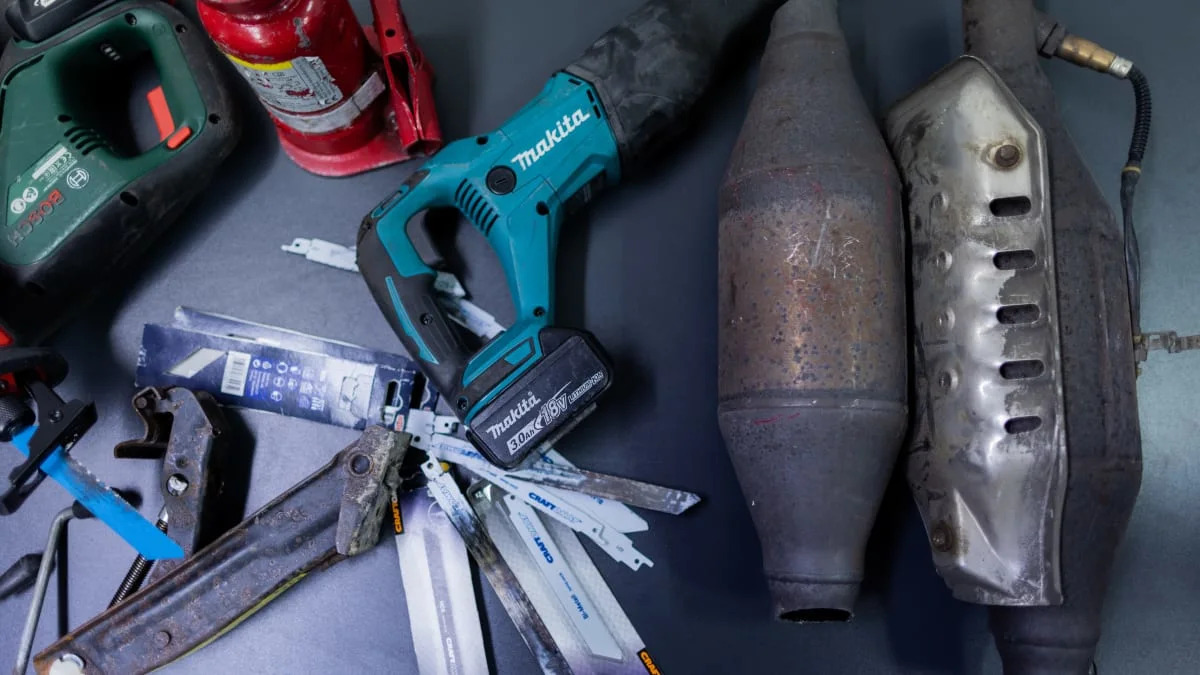There are periods when catalytic converters are part of frequent news stories, and the reason isn't a fun one. From time to time, we'll see an uptick in converter thefts, which makes for clicky headlines, but leaves vehicle owners with expensive repair bills and a sense of anger and vulnerability. Thankfully, the rate of theft has gone down as of late, but as many as 153,000 catalytic converters were stolen in 2022 alone, and it could always spike again. But what is a catalytic converter, how does it work and how can you prevent one from being stolen?
What is a catalytic converter?
A catalytic converter is a component of an internal combustion vehicle's exhaust system. In most cases, it looks like a flattened muffler that resides about halfway down the exhaust pipes. Inside are precious metals such as platinum, rhodium and palladium that are used in chemical reactions to transform emissions into less destructive compounds. Early catalytic converters combined oxygen, carbon monoxide and unburned hydrocarbons to produce less harmful CO2 and water vapor. Later developments also reduced nitrogen oxides.
Do all cars have a catalytic converter?
If your car isn't a classic and is powered by a gasoline engine, the answer is very likely yes. In 1975, the government mandated catalytic converters for almost all passenger vehicles in an effort to reduce air pollution. Combined with other abatement programs, air quality greatly improved over the following years. A side benefit was the elimination of lead additives in fuel since those compounds were incompatible with catalytic converters.
Why do people steal catalytic converters?
Converters end up in the news because of those precious metals inside. There are typically three to seven grams of platinum in a converter, along with up to seven grams of palladium and two grams of rhodium. In May 2024, prices for those metals cost as much as $36 per gram of platinum, $35 for palladium and a whopping $164 for rhodium. To put that into perspective, gold cost $75 per gram.
With this knowledge, thieves have been targeting catalytic converters and have gotten very accomplished at swiping them in an instant. In less than a minute, they can pull the converter loose from the exhaust with a cordless reciprocating saw and disappear into the night. For the trouble, those thieves can net between $50 and $300 from a recycler. If it's from a hybrid vehicle, which requires more of those metals, they can return as much as $1,500.
Can you drive without a catalytic converter?
Technically, a car designed to use a catalytic converter (most cars after 1975) could operate without one. It's a bad idea, though. It will probably be loud and smelly, it might not run well and there is the potential for further damage. It's bad for the environment, and for those in the vicinity inhaling the exhaust, as the gases won't be converted into less harmful emissions. Also, it is illegal in many places to drive without a catalytic converter due to emissions and/or noise regulations.
Catalytic converter replacement cost
The cost to repair the loss for the owner can run around $2,000, but that's not even the worst part. Inventory for replacements can be very low at times, and some victims have been forced to wait several months. Insurance should cover the loss, but many owners may decide to pay it out-of-pocket depending on their deductible or to avoid a rate hike in the future. Third-party manufacturers have sprung up to provide replacements, but shoppers should take care to ensure that those replacement units won't void their vehicle warranty. Some insurance providers have also stated that they will only cover factory replacements, too.
How can you protect yourself from catalytic converter theft?
Law enforcement has been cracking down on theft rings, but as history teaches us, crime always finds a way. It seems unlikely that converter thefts will cease anytime soon, so how do you protect yourself?
In some cases, basic car security measures apply. Parking your vehicle in a well-lit and secure area should help. Installing a motion-activated alarm if the car doesn't already have one is another deterrent. For more specific countermeasures, some owners have taken to having their converters welded to the vehicle frame or had a special metal cage installed around it. Engraving your vehicle identification number (VIN) to the converter is also gaining popularity, but it likely won't prevent attempts. None of these are foolproof solutions, but they could at least discourage amateurs.
Related video:




Sign in to post
Please sign in to leave a comment.
Continue